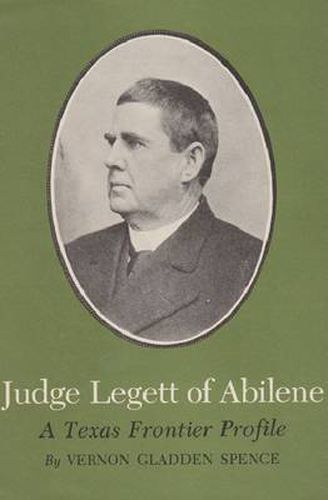Readings Newsletter
Become a Readings Member to make your shopping experience even easier.
Sign in or sign up for free!
You’re not far away from qualifying for FREE standard shipping within Australia
You’ve qualified for FREE standard shipping within Australia
The cart is loading…






This title is printed to order. This book may have been self-published. If so, we cannot guarantee the quality of the content. In the main most books will have gone through the editing process however some may not. We therefore suggest that you be aware of this before ordering this book. If in doubt check either the author or publisher’s details as we are unable to accept any returns unless they are faulty. Please contact us if you have any questions.
When young Kirvin Kade Legett arrived in Buffalo Gap, Texas, in 1879, his principal assets were a good horse and saddle and a license to practice law. When the Texas and Pacific Railroad, building west from Fort Worth, missed Buffalo Gap, the young attorney moved on to Abilene, then a tent city with only two items for sale, a train ticket to git away or a drink to make you willing to stay. The man and the country were to grow up together.Legett’s early clients were buffalo hunters, bone collectors, sheepherders, cattlemen, and farmers, but he eventually handled cases of statewide and even out-of-state importance. Although he refused to seek public office, he had some say about those who did, and most serious candidates for state offices sought his counsel and support. A stock farmer and rancher as well as practicing attorney, Legett was a forceful early advocate of farm diversification and did much to further the development of West Texas agriculture, business, oil exploration, and education. Judge Legett was a pioneer and a man of stature; his life story is, in a real sense, an epitome of the history of West Texas, especially of the Abilene area. By the time of Legett’s death, that rowdy railroad town had become a thriving, modern city. Vernon Gladden Spence’s biography, based on an extensive collection of private papers, offers a clear and detailed portrait of a man whose energies and talents helped turn a wilderness into a habitable and productive country.
$9.00 standard shipping within Australia
FREE standard shipping within Australia for orders over $100.00
Express & International shipping calculated at checkout
Stock availability can be subject to change without notice. We recommend calling the shop or contacting our online team to check availability of low stock items. Please see our Shopping Online page for more details.
This title is printed to order. This book may have been self-published. If so, we cannot guarantee the quality of the content. In the main most books will have gone through the editing process however some may not. We therefore suggest that you be aware of this before ordering this book. If in doubt check either the author or publisher’s details as we are unable to accept any returns unless they are faulty. Please contact us if you have any questions.
When young Kirvin Kade Legett arrived in Buffalo Gap, Texas, in 1879, his principal assets were a good horse and saddle and a license to practice law. When the Texas and Pacific Railroad, building west from Fort Worth, missed Buffalo Gap, the young attorney moved on to Abilene, then a tent city with only two items for sale, a train ticket to git away or a drink to make you willing to stay. The man and the country were to grow up together.Legett’s early clients were buffalo hunters, bone collectors, sheepherders, cattlemen, and farmers, but he eventually handled cases of statewide and even out-of-state importance. Although he refused to seek public office, he had some say about those who did, and most serious candidates for state offices sought his counsel and support. A stock farmer and rancher as well as practicing attorney, Legett was a forceful early advocate of farm diversification and did much to further the development of West Texas agriculture, business, oil exploration, and education. Judge Legett was a pioneer and a man of stature; his life story is, in a real sense, an epitome of the history of West Texas, especially of the Abilene area. By the time of Legett’s death, that rowdy railroad town had become a thriving, modern city. Vernon Gladden Spence’s biography, based on an extensive collection of private papers, offers a clear and detailed portrait of a man whose energies and talents helped turn a wilderness into a habitable and productive country.